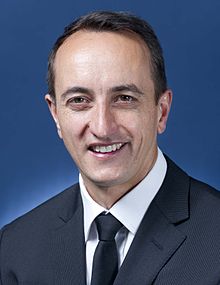FRESH AIR
UPDATES
In defence of Ambassador Dave Sharma
February 23, 2017 | Gareth Narunsky

On February 7, Australia-based online news site Crikey asked the question “Does DFAT support Israeli settlements?” The short piece essentially attacks Australia’s Ambassador to Israel, Dave Sharma, for “his support for the Israeli Government” and for “working with a group that actively promotes the key threat [which is settlements according to the article] to the two-state solution”.
This response was sent to Crikey on February 17, but has not been published.
The arguments presented can be debunked with relative ease. For example, early on the piece asserts that the two-state solution is “dead in the water thanks to incessant Israeli building on occupied land, illegal under the Geneva convention”:
- As can be found here, settlements take up less than two per cent of the West Bank and no new settlements have been built since 1999. In fact, Israel has laws that forbid geographic expansion of settlements.
- Peace Watch’s Lior Amihai said in a 2014 interview, in which he was extremely critical of settlements, that despite them a two-state outcome “is very possible”.
- International law academic Prof Eugene Kontorovich, in a study of Article 49(6) of the Convention as it is applied around the world concluded that “the reaction to [Israel’s] West Bank settlements and interpretation of 49(6) generally applied is ‘entirely anomalous’.”
The piece then cites the fact Sharma organised a workshop on trends, challenges and scenarios on Israel’s northern border in conjunction with US-based organisation The Israel Project (TIP):
“TIP is a strong supporter of Israeli settlements and has commissioned consultants to test the best ways to convince Americans to back them. TIP even attacked outgoing secretary of state John Kerry for his anodyne statement in support of a two-state solution.”
In reality, TIP is not a strong supporter of settlements at all, but merely asked one question about settlements among many in a 2009 study about what language to use when discussing the many complex issues surrounding Israel , the Palestinians and the wider Middle East.
Presumably the second assertion relates to Kerry’s speech of December 2016, which TIP did indeed criticise. However, TIP did not criticise Kerry for supporting a two-state outcome, but rather the lack of balance in his speech, his support for the highly flawed UNSC Resolution 2334 and his insistence that the settlements, and not Palestinian intransigence, rejectionism and incitement, are the primary obstacle to a resolution.
Perhaps most concerning is Sharma is being attacked for doing his job, and doing it very well. Why wouldn’t an ambassador want his staff to be kept fully abreast of challenges and developments in the country in which they serve?
After all, Article 3 of the Vienna Convention on Diplomatic Relations lists, among other things, a function of a diplomatic mission as “ascertaining by all lawful means conditions and developments in the receiving State”. Is a workshop on trends, challenges and scenarios on Israel’s northern border not fulfilling this criteria exactly? As for the assertion of Sharma’s “support for the Israeli Government”, another function of a diplomatic mission, according to the convention, is “promoting friendly relations between the sending State and the receiving State, and developing their economic, cultural and scientific relations”.
Sharma’s proactive approach and out-of-the-box thinking are a big reason why he’s been such a successful ambassador. Some of his highlights are:
- Using sport, entertainment and hi-tech to celebrate the relationship and strengthen links between Australia and Israel.
- Attending a Digital Diplomacy conference to both contribute his ideas and to enhance his own knowledge of the sphere.
- Creating a regular program for ambassadors from smaller countries in Asia and the Pacific to meet with senior Israeli political and judicial figures.
- Taking an interest in Israel’s hi-tech success and what lessons can be learned to boost Australia’s own innovation sector.
- Organising the first oil and gas conference of its kind in Israel.
- Taking his team for lunch at Tel Aviv’s Sarona Market as a show of solidarity the day after a Palestinian terrorist shot four people there.
Indeed, when Sharma’s tenure as Ambassador finishes up in June, his successor will have a hard act to follow, such has been the diligence with which Sharma has done his job.
Let’s be clear – Sharma’s role is to carry out the policy of the elected government in Canberra – that policy is to promote the growth of friendly relations with Israel, and also to work towards an eventual two-state Israeli Palestinian peace resolution. The writer of the Crikey attack may believe that it should be Australian policy to have nothing to do with the current Israeli government and to boycott anyone who is not explicitly and publicly anti-settlement, but that is simply not Australia’s current policy. Further it is not Sharma’s role as a public servant to implement the policy preferred by a blogger at Crikey, but that of the government he represents. And he has done that extremely well.
It is simply immoral to personally attack public servants for carrying out the policy of their elected government, even if one disagrees with it.
Ambassador Sharma should be praised, not attacked.
Gareth Narunsky
Tags: Australasia
RELATED ARTICLES

US Middle East strategy amid regional instability: Dana Stroul at the Sydney Institute

Antisemitism in Australia after the Bondi Massacre: Arsen Ostrovsky at the Sydney Institute





















